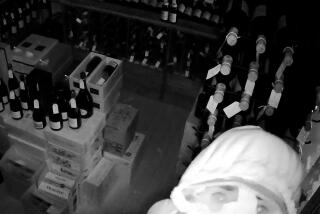Wine Dealer Is Accused of Fraud
- Share via
Wine merchant Ronald Wallace could talk about the noble rot with the passion of a preacher and the knowledge of a true connoisseur.
He specialized in the famed Bordeaux of France, but could hold forth just as eloquently on the rarest Tuscan merlots and German Rieslings, rattling off their best years and the vintners’ family histories.
In the springtime, he tasted the youngest vintages in the ancient chateaus of southwest France and rubbed elbows with Europe’s top wine merchants.
Back in the United States, he invited the mega-rich to tastings at luxury hotels, enticing them to fork over thousands of dollars for wine futures -- deals that promised future delivery of fine wines while they were still aging in their casks.
But federal prosecutors are saying those promises were plonk. Wallace was taken into custody this week after a federal grand jury in Los Angeles accused the 47-year-old businessman of selling wine futures that he never owned, and misusing his clients’ money as part of an elaborate Ponzi scheme.
The elite victims of the alleged scam, outlined in a 21-count indictment, included Hollywood producer Arthur Sarkissian, Seattle Mariner pitcher Jamie Moyer, and Paul and Maurice Marciano, co-chairmen of the clothing company Guess? Inc.
When Wallace’s company collapsed in March 2003, prosecutors say, he owed his clients a total of $13 million in wine.
Some of Wallace’s clients were attracted to the low prices that his company, Rare LLC, advertised in magazines such as Forbes and Wine Spectator. Others were impressed with his knowledge of wine, his charisma and the glamorous circles he moved in -- from the bed-and-breakfasts of St. Emilion to the Peninsula Hotel in Beverly Hills.
Yet in the end, U.S. Atty. Debra W. Yang said, “He turned out to be nothing more than a common fraudster.”
Mark Overberg, a wine lover from Michigan who battled with Wallace over $5,500 in undelivered wine, said he was skeptical about Wallace’s low advertised prices from the beginning.
“I figured either this guy is connected from here to hell or this is just a scam,” he said.
Wallace, who was arrested by federal agents Thursday at his home near Aspen, Colo., is charged with 10 counts of wire fraud, five counts of mail fraud, four counts of money laundering, and an unlawful monetary transaction for importing a BMW M5 from Europe, allegedly with $13,000 of producer Sarkissian’s money. If convicted, Wallace faces a maximum sentence of 195 years in federal prison.
Federal Public Defender Edward Pluss, who is temporarily representing Wallace while he is in Denver, declined to comment on the case Friday.
In Los Angeles, federal prosecutors said Wallace took advantage of the old-school trust that sustains the clubby wine futures industry, an unregulated market where million-dollar deals can be sealed with a handshake.
Selling wine through futures is a long-established method used by the top wineries in the Bordeaux region of France to get the highest prices for their vintages.
In Europe, middlemen called negociants bid for the right to sell barreled wine once it is bottled, often about 18 months later. Then they sell contracts to deliver the bottled wine to importers, who sell similar arrangements to retailers, who in turn sell a final delivery contract to consumers.
The transactions amount to bets that a barreled wine will mature into a coveted, pricey bottle.
“Everybody is turning over money for the promise of delivery,” said Guy Azera, president of Transat Trade Inc., a Gardena importer and wine futures dealer.
Azera said the 2000 vintage of Chateau Haut-Brion Bordeaux first sold for about $200 a bottle wholesale. The wine now sells for about $500 a bottle wholesale.
It is not a poor man’s game. And Wallace was adept at courting the kind of clientele that could buy large quantities of the world’s best wines, said Kurt Hoeke, a wine seller who worked for Rare LLC from 2000 to 2002.
Today, Hoeke believes Wallace lied to some of his clients. But he also said that working for him was a thrill. Wallace, he said, gained his wine experience in high-end Seattle restaurants. He was a big, blond, well-spoken man, “very kind -- a generous person, and always very talented about his wine,” Hoeke said. “He knew his product well, and he was quite the salesman.”
Rare LLC was incorporated in 1994, and when Hoeke arrived, it was being run by about 10 employees out of a nondescript Aspen Valley office building. They sold wine futures, but also sold expensive bottles of wine directly to customers, advertising prices in magazines and a now-defunct website that touted the company’s relationships with “the best wineries and sources in Europe.”
Wallace also took his show on the road. The company came through with many wine orders over the years, and Hoeke said Wallace had developed a good reputation with a number of exclusive clients by word of mouth. These high-rollers often were invited to wine tastings at hotels in Chicago, Los Angeles, New York and Seattle. Wallace often asked that they bring their well-heeled oenophile friends along.
It was a tough group to impress, but Wallace knew what he was doing.
Wine lover Scott Brickell attended Wallace’s tasting last year at the Peninsula Hotel in Beverly Hills.
“I have been around a lot of goodies before, but he had every big name in wine,” Brickell said. “You could go from table to table and help yourself.”
Brickell said he didn’t pay much attention to Wallace because he was there just for the free wine and didn’t intend to buy. “But it was obvious they were fishing for whales who had a lot to spend,” Brickell said.
Hoeke, a former chef, traveled with Wallace twice to exclusive early tastings in the Bordeaux region. He mingled with the biggest wine merchants from New York and Paris. After the domestic tastings, Rare LLC employees usually treated clients to dinners at the best restaurants.
“Each experience astonished me as to how lavish it could be,” Hoeke said.
But he said he was also aware early on that Rare was trying to pay off old debts. After his first year of work, he said, the company appeared to be stumbling: Some of his clients began complaining that they had not received their wine shipments.
“I could see that there were more problems than I was aware of,” Hoeke said. “It was getting difficult to deliver various wines to my clients. I could no longer justify being there.”
Hoeke left Rare in October 2002. In the months that followed, the federal government began investigating. The FBI served a search warrant at Wallace’s home in February 2003. As word of the investigation spread throughout the wine world, chat rooms filled up with comments from worried customers.
“I am due 1 mixed case of 1999 Guigal lala’s, due this spring sometime, to the tune of $3,250 or so,” a wine lover named Christopher wrote in a February 2003 posting.
The indictment alleges that Wallace defrauded customers from 1999 to early 2003, when creditors forced him into bankruptcy.
Assistant U.S. Atty. Pamela Johnston said Wallace had about 600 victims, many of whom were never reimbursed. The company is being liquidated but has few assets to dole out to creditors, she said.
The 35-page indictment details the alleged scheme, which Wallace carried out by “purporting to sell older bottled wines that he did not own, by purporting to sell wine futures he did not own, and by diverting and misusing money that his clients had entrusted to him.”
In one example, clothing magnate Paul Marciano paid Rare more than $114,000 for 1998 Bordeaux futures. But Wallace instead used the money to pay himself, his wife and a French negociant for other wines, the indictment states.
In 2000, Marciano’s brother Maurice paid Rare $500,000 for 1999 Bordeaux futures. According to the indictment, Wallace again spent the money on himself and on other wines from a negociant in London.
Toward the end of 2000, Rare began advising clients of the quality of that year’s Bordeaux vintage, dubbed by some tasters as the vintage of the millennium.
The Marcianos were among Rare’s biggest clients for the bottled Bordeaux, and were getting antsy for delivery, according to Hoeke and prosecutors. To solve the problem, Wallace purchased, on the open market, much of the 1998 wine he had promised them. He apparently took a financial bath, paying prices that “well exceeded” those he had set with the Marcianos, the indictment states.
Wallace had taken in at least $8 million for the 2000 wine futures from his clients, much of which he spent on unrelated personal and business expenses, prosecutors say.
The next Bordeaux crop, in 2001, was unremarkable, but Wallace still sold $800,000 in futures on the vintage. Among the buyers was Mariner pitcher Moyer, who had met Wallace at a wine tasting in Seattle.
Prosecutors said Wallace failed to tell Moyer about his poor business standing -- including negociants who no longer would take his orders because he wasn’t paying them on time. But Wallace convinced the left-handed hurler to send him a $30,000 check.
Johnston, the assistant U.S. attorney prosecuting the case, said of Wallace’s case: “What makes it fraud is that after he got behind, he kept lying and covering up to his futures customers as he kept bringing new people in.”
Overberg, the customer from Michigan, said he only got fully reimbursed by Wallace after filing a complaint with a Colorado chapter of the Better Business Bureau and that state’s attorney general’s office. But even though he had argued heatedly with Wallace over the phone, Overberg believed that Wallace was more of a bad businessman than a scam artist.
“I told them this guy was just in over his head and didn’t know what to do about it,” Overberg said. “He didn’t mean to defraud anybody -- he had people clamoring for wines but didn’t have the means to purchase them.”
Johnston takes a dimmer view. She pointed to some of the lavish expenditures Wallace allegedly made with his clients’ money.
In one instance, he used that money to pay his bill at his local country club, the Roaring Fork Club, she said.
In 2003, the Roaring Fork dining room was honored for having the nation’s best private-club wine list by the National Restaurant Assn. Education Foundation.
Times staff writer Jerry Hirsch contributed to this report.
More to Read
Inside the business of entertainment
The Wide Shot brings you news, analysis and insights on everything from streaming wars to production — and what it all means for the future.
You may occasionally receive promotional content from the Los Angeles Times.










